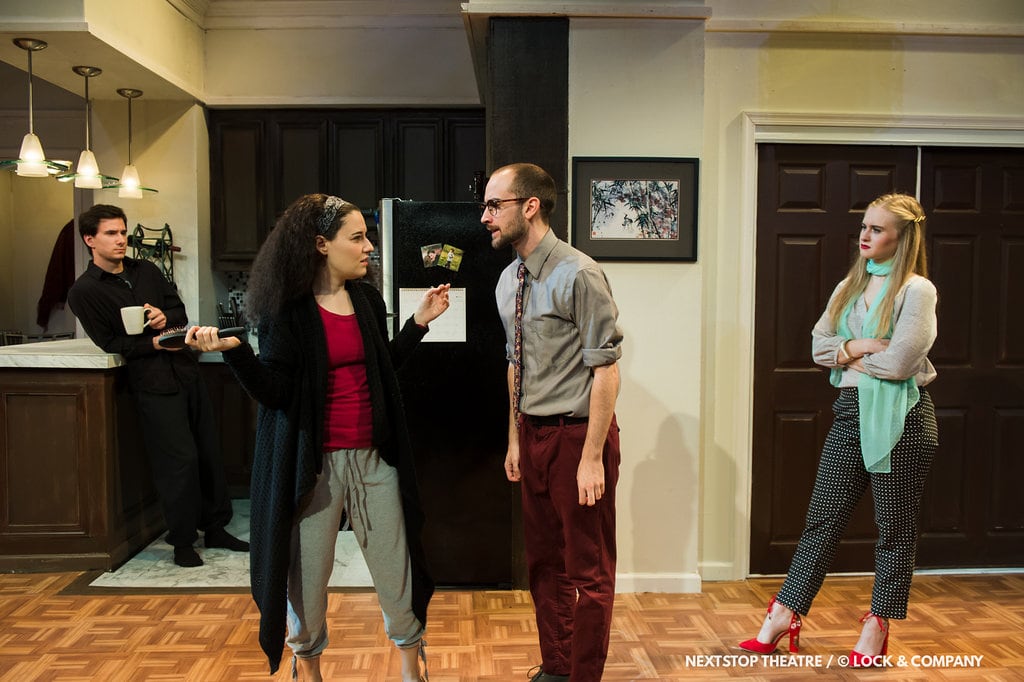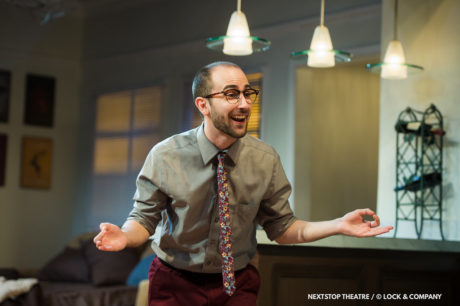What must their mothers have been like? Certainly, cousins Daphna and Liam (Sophie Schulman and Noah Schaefer), the antagonists in Joshua Harmon’s Bad Jews, now playing at Herndon’s NextStop Theater – both expert wielders of weaponized wit – have nothing good to say about any of their progenitors, except their recently deceased grandfather. Nor do they have anything good to say about one another. Quite the contrary. Clearly, their enmity did not suddenly spring into existence on the occasion of the grandfather’s funeral; it is a long-standing feud, the origins of which are left to the audience’s speculation. Their families of origin could hardly have been oases of peace and harmony.

But what a spectacularly fireworks-filled feud it is. Seldom since George and Martha engaged in mortal marital combat in Who’s Afraid of Virginia Woolf have family members used words to such cleverly lethal effect. Both actors have long, brilliantly delivered, invective-filled monologues in which they excoriate the other, as well as a multitude of sharp-edged exchanges.
Much of their contention swirls around their 180-degree difference about their Jewishness. Since a recent trip to Israel, Daphna has become a zealous adherent to the traditions of her faith, slamming Liam for his atheism, not to mention his non-Jewish girlfriends. There’s a serious debate between them at one point about what Jewish identity means in today’s world and whether it matters. But given who these characters are, and how they have related to each other over time, if they weren’t quarreling about Jewish identity, they’d find something else, anything else, to fight about.
Schulman’s Daphna is vocally high-pitched, shrill, and fast-paced. She prowls the stage, probing here and there for any sign of vulnerability in the other characters, then pouncing like lightning once she finds a weakness. Schaefer’s Liam is tense, angry, and, if anything, even louder than his adversary. The third cousin in the play, Jonah (Vitaly Mayes), is a weary veteran of this ongoing familial warfare. In his quieter, more laid-back way, he has decided that the way to survive is to keep his head down and, as he frequently says, not get into the middle, in between Daphna and Liam not being a safe space. Being the default peacemaker in this toxic family dynamic is a thankless job, but Mayes’ Jonah carries it off gracefully.
There is a MacGuffin in the play, a religious keepsake called a “chai,” which their grandfather carried with him as he survived the Holocaust. As Liam and Daphna fight over it, it comes to illustrate that each of the characters has a very different, mutually incomprehensible way of mourning their grandfather’s death. Daphna craves the object as a symbol of carrying on what she sees as her grandfather’s cultural and religious heritage. Liam sees it as a romantic token, the equivalent of an engagement ring, to give to his girlfriend, as his grandfather had given it as an engagement present to his fiancée, many years before. Jonah, abstaining from the battle of the chai, has an alternative, and at the end of the play, very touching way of remembering his grandfather.

Liam’s girlfriend, Melody (Elizabeth Kate Vinarski), is about as non-Jewish as one can get, a blond Chicago girl bringing a refreshing breeze of Midwestern niceness into the cousins’ very New York City contentiousness. As Daphna is quick to point out, she is not as bright as Liam. She is, from all appearances, a bit of a ditz, though, as Vinarski plays her, she has a moral center and the ability to stand up for herself and others.
With fewer lines than the principal characters, Vinarski shines in her reactions to the shenanigans around her. Her amazement and dismay when she sees a side of her boyfriend she has never before encountered before, as he rails against Daphna, is priceless. She has another strong moment when, during the one time in the play that the three cousins are happy together, howling with mirth at the memory of a disastrous family dinner at a Japanese restaurant, Melody is left to look on from a distance and realize how much of an outsider she is. When, near the end of the evening, she decides that she would rather visit a hospital emergency room than deal with another minute of the madness, it is hard to disagree with her choice.
Harmon’s writing is fluid, articulate, and pointed, and the characters, however unsympathetic, never fail to be interesting. While the script’s humor is largely based in the mean-spiritedness of its main characters, there are a lot of very funny lines that the audience appreciated. The actors, under the direction of Cristina Alicea, deserve great credit for not only maintaining the generally rapid pace of the dialogue without missing a beat but for knowing when to pause, providing occasional moments of quiet before roaring off into the next flight of acrimony. Each actor gets to make the case for his or her character, and the actors take good advantage of their opportunities to do so.
Jack Golden’s set is a realistic depiction of an upscale New York studio apartment, with an entrance hall stage left, in which a few scenes are played. There is a kitchen at center, and the stage right side of the set is filled with three beds, giving the place something of the feel of an Airbnb. Because the bulk of the set dressings are stage right, and the majority of the blocking is center and right, the stage pictures tend to tilt in that direction. In some ways, the most interesting room is one the audience never sees, a bathroom with an oft-mentioned view of the Hudson. On a few occasions, one character goes into the bathroom while others carry on as if the person wasn’t there. When Melody emerges from one such bathroom stint, she provides one of the funniest moments of the show by observing that, you know, someone in the bathroom can hear every word.
Running Time: 90 minutes, with no intermission.
Bad Jews plays through June 17, 2018, at NextStop Theatre, 269 Sunset Park Drive, in Herndon, VA. For tickets, call (866) 811-4111 or go online.




